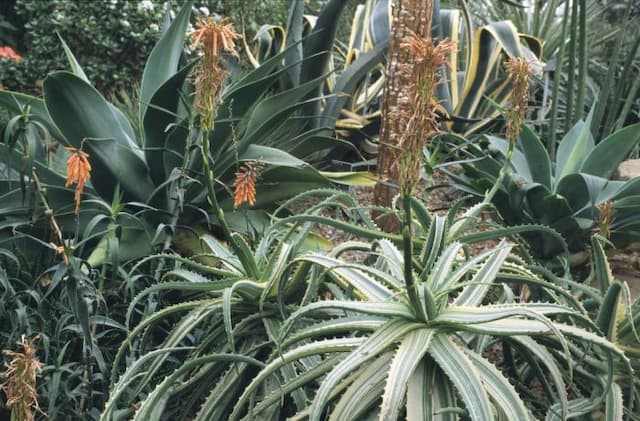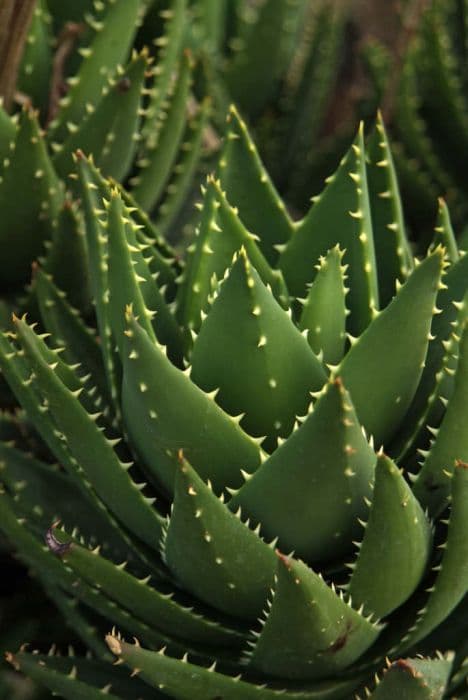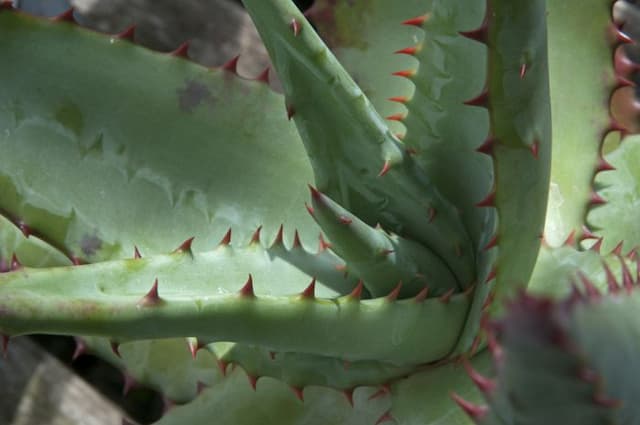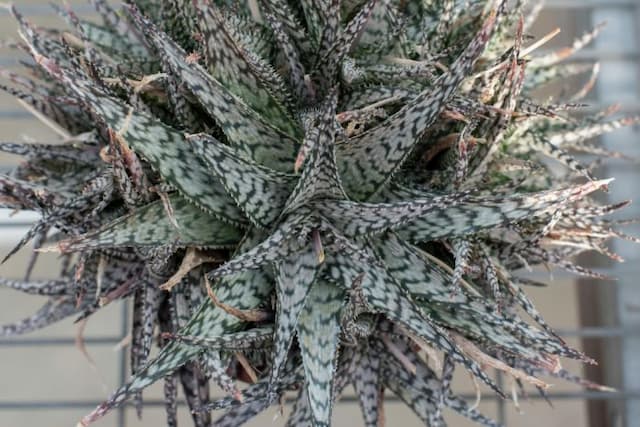Red hot poker Kniphofia 'Percy's Pride'

ABOUT
'Percy's Pride' is a striking perennial plant known for its unique flower spikes. It has a clump-forming habit, with grass-like foliage that is a deep green color. The leaves are long, slender, and slightly arching, creating a lush base for the flower display. The most outstanding feature of this plant is its flower spikes, which exhibit a bold coloration. The blooms are tubular and densely packed around each spike, starting as greenish-white buds that gradually open to a soft creamy-yellow hue as they mature. These flowers are organized in a dense, cylindrical, raceme fashion and provide a strong vertical element to the garden when in bloom. They rise above the foliage and can give the impression of flickering torches, which is why the common name for these plants includes the term "torch lily." The blooming period provides a visual spectacle and attracts hummingbirds and butterflies to the garden. After the flowers fade, the plant continues to offer textural interest with its persistent foliage that remains attractive throughout the growing season.
About this plant
 Names
NamesFamily
Asphodelaceae
Synonyms
Red Hot Poker, Torch Lily, Tritoma
Common names
Kniphofia 'Percy's Pride'.
 Toxicity
ToxicityTo humans
Red hot poker (Kniphofia 'Percy's Pride') is not commonly listed as toxic to humans. However, as with many plants, sensitive individuals may experience varying degrees of irritation if they come into contact with it or ingest parts of the plant. In general, it's always a good practice to avoid eating plants that are not known to be safe for consumption. If ingested, one might experience symptoms such as nausea, vomiting, or diarrhea, though such reports are rare due to the plant's typical non-use as a food source.
To pets
Red hot poker (Kniphofia 'Percy's Pride') is not commonly listed as toxic to pets. However, individual pets may react differently to ingesting plants, and some might experience mild gastrointestinal upset such as vomiting or diarrhea. If you suspect your pet has ingested a significant amount of the plant and is showing symptoms of distress, it is best to consult with a veterinarian.
 Characteristics
CharacteristicsLife cycle
Perennials
Foliage type
Evergreen
Color of leaves
Green
Flower color
Yellow
Height
3 feet (0.91 meters)
Spread
2 feet (0.61 meters)
Plant type
Herb
Hardiness zones
6
Native area
South Africa
Benefits
 General Benefits
General Benefits- Attracts pollinators: Kniphofia 'Percy's Pride', also known as Red Hot Poker, is attractive to bees, butterflies, and other beneficial insects, which help in pollination.
- Drought tolerance: Once established, this plant is highly tolerant of drought conditions, making it suitable for xeriscaping and water-wise gardens.
- Low maintenance: Red Hot Poker requires minimal care and upkeep, making it an excellent choice for gardeners of all skill levels.
- Long blooming period: It has a lengthy flowering season, which provides a vibrant display of color for an extended period.
- Deer resistance: The plant is known to be resistant to deer, reducing the likelihood of damage in areas with high deer populations.
- Architectural interest: With its tall flower spikes and striking coloration, the Red Hot Poker can add vertical interest and a unique structural element to a garden design.
- Versatility in landscaping: It can be used in a variety of landscaping settings, including borders, beds, and as a focal point in garden designs.
- Durable: The sturdy nature of the Red Hot Poker makes it resistant to many common pests and diseases, ensuring a healthy and long-lasting garden feature.
 Medical Properties
Medical PropertiesThis plant is not used for medical purposes.
 Air-purifying Qualities
Air-purifying QualitiesThis plant is not specifically known for air purifying qualities.
 Other Uses
Other Uses- The dried seed pods of Red Hot Poker can be used in floral arrangements, adding an exotic and long-lasting touch to bouquets and centerpieces.
- Due to its striking appearance, Red Hot Poker can be used in art and photography projects, particularly as a subject for botanical illustration or macro photography.
- The long and sturdy flower stalks of Red Hot Poker can serve as natural stakes in the garden for supporting other, less rigid plants.
- When planted en masse, Red Hot Poker can act as a living privacy screen or windbreak in the garden, due to its clumping nature and tall flower spikes.
- The foliage of Red Hot Poker, when dried, can be woven into mats or baskets by skilled craftspeople, making use of its fibrous quality.
- Red Hot Poker can be used as an educational tool in schools and botanical gardens to teach about plant adaptations, such as those for attracting pollinators.
- The plant can be included in themed gardens, such as fire or sunset-themed spaces, due to its fiery-hued blooms.
- In areas where appropriate, Red Hot Poker may be used to stabilize soil and prevent erosion on sloping ground in the landscape.
- Red Hot Poker can be incorporated into nocturnal or moon gardens, as its bright flowers can be quite reflective under moonlight, providing a unique nighttime visual appeal.
- The vibrant and unusual flowers of Red Hot Poker can be used in costume design, either as inspiration or actual components in avant-garde fashion and theatre productions.
Interesting Facts
 Feng Shui
Feng ShuiThe Red Hot Poker is not used in Feng Shui practice.
 Zodiac Sign Compitability
Zodiac Sign CompitabilityThe Red Hot Poker is not used in astrology practice.
 Plant Symbolism
Plant Symbolism- Standout Appearance: Kniphofia 'Percy's Pride', commonly known as Red Hot Poker, often symbolizes a bold or fiery personality due to its bright and striking flower spikes.
- Attraction: The vibrant blooms attract hummingbirds and butterflies, making it a symbol of allure and magnetism.
- Strength: Its sturdy stems and resilience in the garden can represent strength and persistence in adversity.
- Warmth: The warm colors of the flowers resemble flames, often symbolizing warmth, passion, and energy.
 Water
WaterRed hot poker plants require regular watering to establish their deep and extensive root system, especially during their first growing season. After establishment, they are quite drought-tolerant and require less frequent watering. Water the plant deeply about once a week, providing about 1 gallon of water to reach the deep roots. In hotter, arid climates or during periods of extreme heat, increase watering to twice a week. Always allow the soil to dry slightly between waterings to prevent root rot. During the winter, cut back on watering as the plant goes dormant and requires less moisture.
 Light
LightRed hot poker plants thrive best in full sun conditions, receiving at least 6 to 8 hours of direct sunlight each day. They can tolerate light shade, but flowering may be reduced in less optimal light. Place them in a spot where they get ample morning light and protection from the intense afternoon sun if you live in an exceptionally hot climate.
 Temperature
TemperatureRed hot poker plants prefer a temperate climate and are hardy in USDA zones 5 through 9. They can withstand temperatures as low as 10 degrees Fahrenheit but are happiest when temperatures range between 50 to 85 degrees Fahrenheit. Extreme cold or prolonged frost can damage the plant, so provide some mulching or protection if temperatures drop significantly below the recommended range.
 Pruning
PruningPruning red hot poker plants is mainly for aesthetic purposes and to promote blooming. Remove spent flower spikes to encourage additional blooming and tidy up the plant's appearance. Cut back the foliage to the ground in late fall or early winter, as the plant begins to go dormant, to keep the garden tidy and prepare for new growth in spring. Additionally, remove any damaged or dead leaves throughout the growing season to maintain plant health.
 Cleaning
CleaningAs needed
 Soil
SoilRed hot poker 'Percy's Pride' thrives in well-draining soil with a pH range between 6.0 and 7.0. A soil mix of loam, sand, and peat is ideal, ensuring proper drainage while retaining enough moisture. Amending the soil with organic compost can enhance nutrient content and improve soil health for this perennial's growth.
 Repotting
RepottingRed hot pokers, including 'Percy's Pride', typically do not need frequent repotting as they are perennial plants. They prefer being undisturbed, so repotting is only necessary every 3-4 years or if the plant shows signs of being root-bound.
 Humidity & Misting
Humidity & MistingRed hot poker 'Percy's Pride' is tolerant of a wide range of humidity levels but does best in average garden humidity conditions. It does not have specific humidity requirements, making it adaptable to various outdoor settings without the need for specialized humidity controls.
 Suitable locations
Suitable locationsIndoor
Place in bright light, keep soil moist but well-drained.
Outdoor
Full sun, well-drained soil, space 18 inches apart.
Hardiness zone
6-9 USDA
 Life cycle
Life cyclePercy's Pride, a cultivar of Red Hot Poker, begins its life cycle when its seeds germinate in warm, moist soil, typically in spring. Once the seedlings establish, they grow into clumps of grass-like, evergreen foliage, from which sturdy flower stalks arise, usually in late spring or early summer. The plant reaches a mature flowering stage with tall spikes bearing white to cream tubular flowers, which are attractive to hummingbirds and other pollinators. After blooming, the flowers fade and seed pods may develop, containing seeds that can be dispersed to propagate new plants. Over time, the clumps of foliage may become crowded and can be divided in late spring or early autumn to maintain plant vigor and to create new plants. In winter, the plant may die back, especially in colder climates, but typically it is semi-evergreen and will rejuvenate foliage in the spring before entering another blooming cycle.
 Propogation
PropogationPropogation time
Spring to Summer
The most popular method of propagating Kniphofia 'Percy's Pride', commonly known as Red Hot Poker, is by division. This process is typically done in the spring or early fall. To propagate by division, carefully dig up an established clump and gently separate it into smaller sections, ensuring that each section has a portion of the root system intact. These divisions can then be replanted at the same soil depth they were previously growing. Water the newly planted divisions thoroughly to help establish them in their new location. With proper care, these divisions should develop into strong, independent plants that will mature and flower in subsequent seasons.









